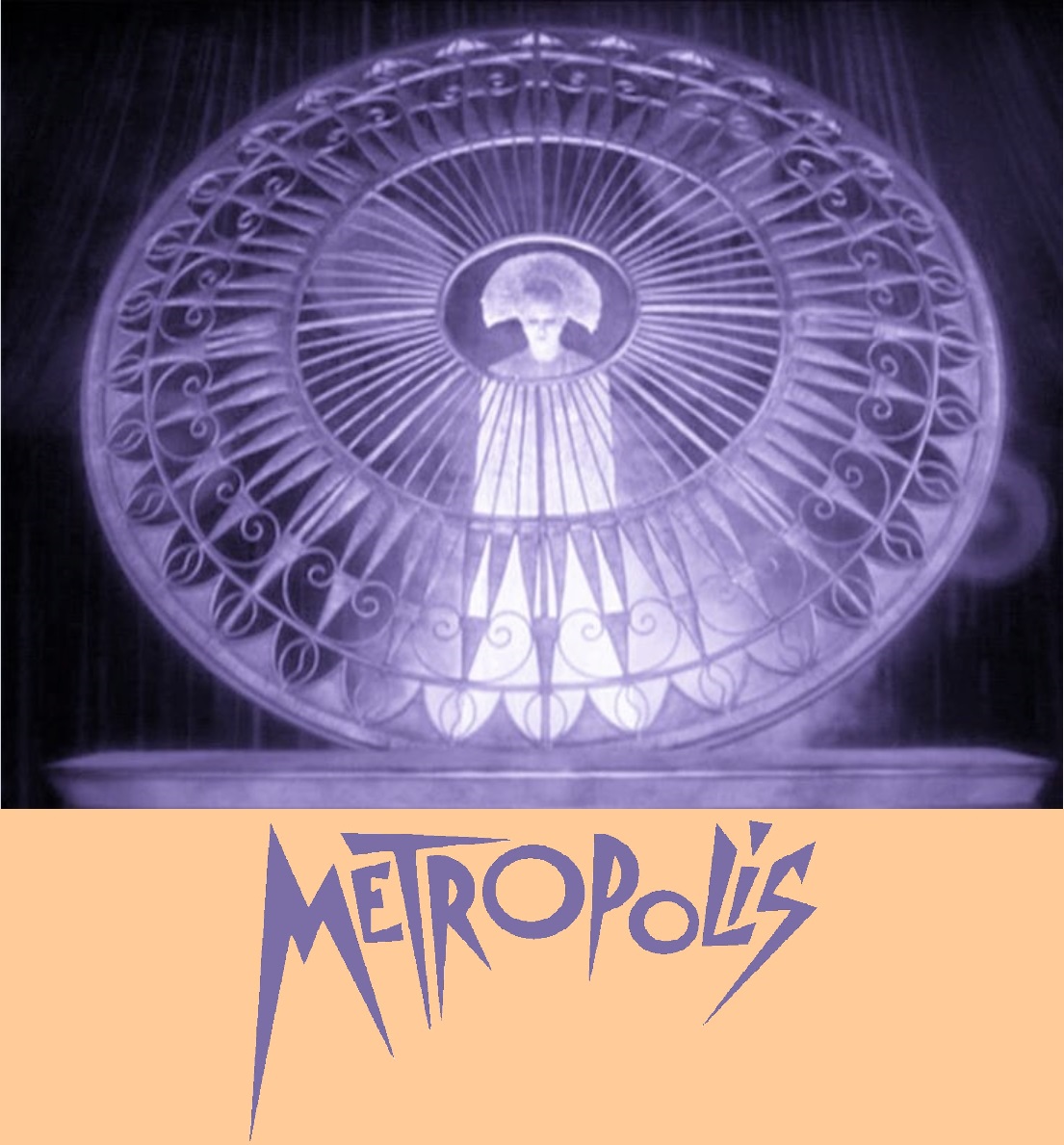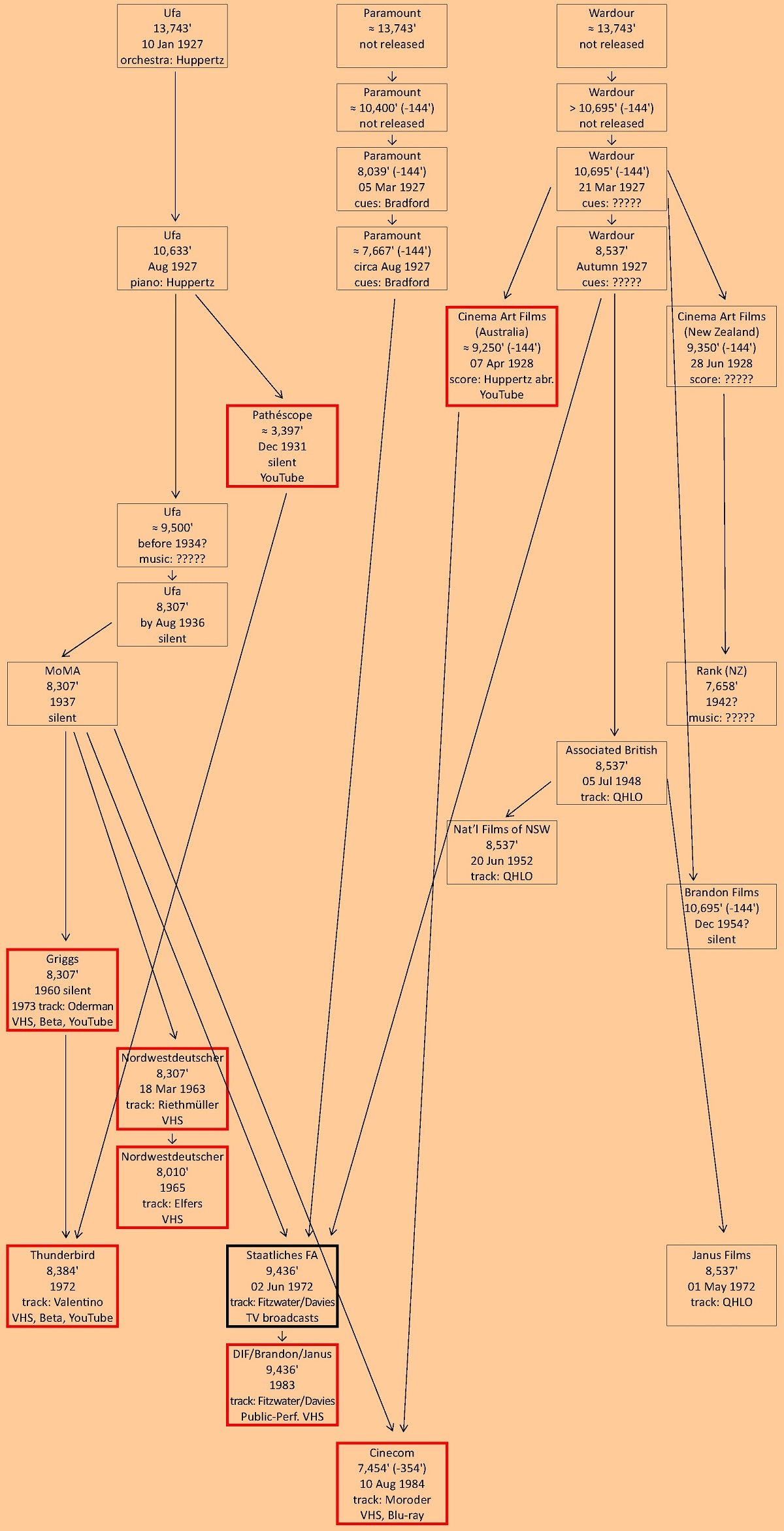|
That took me something like six months to work out.
That is the information I kept searching for in all the scholarly books and articles,
but each book and each article supplies only a tiny fraction of that info.
The rest I had to puzzle together by analyzing more videos than I ever wanted to pay for.
This is what I do with my spare time.
Other people drink beer.
I obsess over camera angles and splice marks.
Other people have social lives.
I have a cat.
The red outlines indicate editions that have been available on VHS
and/or that are presently available on YouTube.
The 1983 edition is probably impossible to find.
The Eckart Jahnke (BBC/PBS) edition was shown on television a few times, many moons ago,
but was never issued on home video.
Anyway, the latest restorations, including the best of them, from 2010,
made use of nearly everything above, but the people in charge entirely forgot
to check through the Pathéscope 9.5mm edition from 1931.
There are a couple more seconds in it that should really be put back into the movie.
There seem to be more branches to this family tree, and that perplexes me.
Please take a look at
“Collections Search | BFI | British Film Institute.”
Let us join hands and prance down the list together.
Some of the links do not yet work, as this site is under construction and has been for ten years now,
and so, if plans work out, they should burst forth into life before century’s end.
Actually, chances are that NONE of the links will work, unless you first click on the
link above.
Clicking on that link unlocks some of the links below.
C-105563
35mm Magnetic - Sound
Status pending - Material requires inspection to determine preservation or access status
Whether this is mag stripe or full coat is not specified.
There WAS an indication that this is in four cans, which would mean that it can be no longer than 8,000',
but the only version that would match is the August 1927 Paramount edition,
which, to the best of my knowledge, was never reissued.
The indication of it being in four cans has now vanished from the BFI site, and so perhaps it was in error.
That statement popped up sometime around 13 May 2023, but was taken down immediately, and the
WayBackMachine did not capture it.
Instead, the captures are all
“Sorry, there's a problem. The site is still in development, and changes regularly,
so please try again later if this error persists.”
Unfortunately, there is no date supplied for this mag sound, and so we are left helpless to conjecture what this really might be.
C-105564 35mm Dupe Negative - Safety - Silent - 49 Feet
Master - Restricted access to preserved film
A silent safety dupe negative? There is no date. What is this and why? It is only a fragment, less than a minute long.
C-105565
35mm BW Positive - Safety - Mute - 9630 Feet
Viewing - Access to film print is subject to clearance (servicing required)
“Safety” likely indicates “post-1949.”
“Mute” indicates that the left side, where the soundtrack should be, is blank.
9,630 feet? Where does that fit into our family tree above?
If we but only had a date on this, we could narrow down the possibilities, maybe.
C-105566
35mm BW Positive - Nitrate - Silent - 8539 Feet - Stock date: 1927
Master - Restricted access to preserved film
A match! Patalas measured the Associated British print as 2,602m, which is 8,537 feet.
Close enough!
This is clearly the same material.
The stock is dated 1927, and the format is silent, though, confusingly, it is black and white rather than tinted.
I begin to suspect that the British release was black and white.
Was this common for British releases? I don’t know. Do you?
Could it have been that the 10,695' edition shown at the Marble Arch Pavilion première was tinted,
but that the subsequent prints destined for the provinces were b&w?
Anyway, this is clearly a print received from Ufa in the autumn of 1927, when the film was being shown in the provinces.
Oh! It just now occurs to me!
What I bet happened was that Ufa offered tinted prints for export,
but also made b&w prints for foreign distributors who wanted to save money.
C-105567
35mm Positive - Silent
Status pending - Access to film print is subject to clearance
No date. No length. No stock indicated.
Ahhhhhhhhhhhhhhh!
Martin Koerber provided the length of the MoMA edition as 2,532m, and when I plug that into the meters-to-feet converter, I get 8,307'.
All this is approximation.
This 8,308' edition is surely identical.
MoMA sent the National Film Library (BFI) a copy negative in 1938.
Now we learn that it was not until 1939 or perhaps a year or two later that the National Film Library got to work on it
and generated a duplicating positive as a backup prior to making prints. Ahhhhhhhhhhhhhh!
C-105569
35mm BW Positive - Safety - Silent - 350 Feet - Stock date: 1952
Status pending - Material requires inspection to determine preservation or access status
1952 stock, silent format, but a fragment of 350 feet.
Why? Did this relate somehow to the preparations for the 1952 export to Australia?
C-105570
35mm Dupe Negative - Nitrate - Silent - 8271 Feet
Master - Restricted access to preserved film - suitable for duplication
This does not match anything in the above family tree, and what was the need for a dupe negative at that time?
C-105571
35mm BW Positive - Safety - Silent - 650 Feet - Stock date: 1952
Status pending - Material requires inspection to determine preservation or access status
Another silent fragment from 1952.
Again, this might be related to the export to Australia.
C-105572
BW Positive - Nitrate - Silent
Master - Restricted access to preserved film
No length or date is supplied.
Since it is both silent and nitrate, that would likely place this sometime between 1927 and 1930.
Since it is b&w, that probably narrows it down to between October/November 1927 and 1930.
C-105573
35mm BW Positive - Nitrate - Silent
Master - Restricted access to preserved film
What is the length? What is the date? Has anybody ever checked this?
C-105574
16mm BW Positive - Safety - Silent - 3244 Feet
Viewing - Viewing experience and projection may be compromised by condition of film print (servicing required)
3,244 feet in 16mm equals 8,110 feet in 35mm.
That’s vaguely similar to the length of the Nordwestdeutscher edition of 1965 with the Elfers score,
and that, I suppose, is what this is.
I would hazard that the 3,244' is a misprint for 3,204'.
C-105575
35mm Positive
Status pending - Access to film print is subject to clearance
No date, no length, no identification of stock.
C-105576
35mm Dupe Negative - Nitrate
Status pending - Material requires inspection to determine preservation or access status
No date. No length. Just a mystery.
C-105577
35mm Positive - Nitrate
Status pending - Material requires inspection to determine preservation or access status
No date, no length.
C-105582
35mm Positive
Status pending - Access to film print is subject to clearance
No date, no length, no indication of stock.
C-105583
35mm Dupe Negative - Nitrate - Silent - 950 Feet - Stock date: 1946
Master - Restricted access to preserved film
1946? Makes sense. Stock dated 1946 was surely still being sold in 1948.
This is certainly related to preparations for the July 1948 reissue.
C-105584
35mm Dupe Negative - Nitrate - Silent
Master - Restricted access to preserved film
What was this and why? What is the date? What is the length?
C-105585
35mm Duplicating Positive - Acetate - Silent - 9725 Feet - Stock date: 1975
Master - Restricted access to preserved film
That this would be from 1975 would make sense, as that would seem to tie in to the preparation for the BBC2 broadcast.
Did the BBC2 receive a copy negative rather than a print?
It didn’t look like it.
What the BBC2 broadcast looked like a somewhat worn theatrical release print.
Be that as it may, we are left with a major question: Why is it 9,725'?
That’s almost 300' longer than what was broadcast.
C-105586
35mm Dupe Negative - Acetate - Silent - 8557 Feet - Stock date: 1971
Master - Restricted access to preserved film
The length is remarkably similar to the 8,537' length of the Associated British reissue of July 1948.
Why would a dupe negative be needed in or just after 1971?
By that time, Nordwestdeutscher had licensed to EMI its own edition with the Konrad Elfers score,
and the previous Associated British edition was treated as obsolete.
Why am I confused?
|

